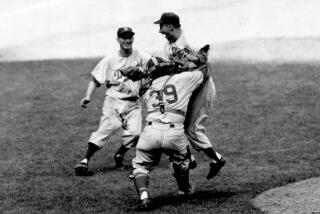Dodgers beat Red Sox in the longest game in World Series history
- Share via
The joyous throng gathered around home plate at 12:30 a.m. on Saturday, seven hours and 20 minutes after this monstrosity of a baseball game had begun.
Never before had a World Series game lasted this long.
Never before had a playoff game lasted this long. Never before had the Dodgers experienced a victory quite like their 3-2 walkoff over the Boston Red Sox in Game 3 of the World Series, an 18-inning agony that ended with sweet relief when Max Muncy launched a solo home run.
“The feeling was pure joy and excitement,” Muncy said. “That’s about all I can think of, because it’s hard to describe how good a feeling it is.”
The Dodgers crowded the plate as Muncy rounded the bases. Dodger Stadium teetered with delirium. Muncy disappeared inside the throng, having taken Boston pitcher Nathan Eovaldi deep and perhaps tilted the balance of this series. The Dodgers still trail in the series, 2-1. But the cost of Boston’s pitching decisions may last beyond the marathon.
Eovaldi had been listed as Boston’s starter for Game 4, scheduled for Saturday evening. Instead he pitched six innings, logging 97 pitches and effectively wiping himself out of consideration for the next two games at Dodger Stadium. Boston manager Alex Cora did not commit to a replacement in the aftermath. As if the series required more intrigue, at 1:27 a.m., the Dodgers announced their Game 4 starter was no longer Rich Hill, but would be named later.
The particulars of Game 3 boggle the mind. The teams combined to throw 561 pitches. There were almost as many strikeouts (34) as hits (18). Muncy ended the game in his eighth plate appearance. It was his first time up after nearly ending the game by hooking a ball just foul down the right-field line.
“My goodness,” infielder David Freese said. “I don’t even know what happened tonight. Man. How do you pull a walkoff homer barely foul and then go oppo tank next AB? That’s incredible.”
The postgame celebration was far from raucous. The players were too tired to gloat. Around the 15th inning, the team’s chef distributed peanut butter, honey and banana sandwiches. The Dodgers built a shrine composed of bananas and paper cups, with infielder Brian Dozier pouring sunflower seeds as an offering to the baseball gods.
Around the 16th inning, Hill went to Roberts and asked: What do you need? The Dodgers needed offense, more than pitching. Clayton Kershaw appeared as a pinch-hitter in the 17th. He lined out, in one of the better at-bats by a Dodger in the late hours.
The sluggish offense performance underscored a reality from Game 3: a loss, and a 3-0 deficit, would have been devastating.
“Huge win, because of a lot of different factors,” utility man Enrique Hernandez said. “Not only are we down, 2-1, instead of 3-0, but they put a toll on their bullpen, as well.”
Hernandez’s voice was hoarse. The fans who stayed at Dodger Stadium until the end could relate.
“As the game kept going, you look up and see the 18th inning, and you’re like ‘Holy cow, where did the game go?’ ” Muncy said. “Those last nine innings or so just kind of blended together.”
A series of excruciating outcomes sent the game into extra innings. A symbol of urgency rose midway through the seventh inning, as the Dodgers clung to a one-run lead against baseball’s best offense. Kenley Jansen had logged only a pair of two-inning appearances all season, but the time for caution had long passed. Needing a victory to stall Boston’s momentum, Roberts turned to his closer.
After seven scoreless innings from rookie ace Walker Buehler, it was up to Jansen to slam the door. He could not. He served up a tying solo home run tor Jackie Bradley, Jr., on a 2-0 cutter with two out in the eighth. Jansen returned for a scoreless ninth, but his mistake ruined a gorgeous outing from Buehler, who struck out seven and permitted two hits in seven scoreless innings.
In the bottom of the ninth, the Dodgers squandered an opportunity. One day removed from an 88-pitch start in Game 2, Boston’s David Price loped into the game. He gave up a leadoff single to Cody Bellinger. Trying to put himself in scoring position, Bellinger got picked off, moments before Yasmani Grandal took a walk. Cora turned to closer Craig Kimbrel, who walked Chris Taylor but got pinch-hitter Dozier to pop up and strand the runners.
The decision to use Dozier was puzzling, with Freese on the bench. The Dodgers prefer using Freese against left-handers, but Dozier has been a dud since arriving at the trade deadline. Freese began the game batting .400 in the postseason. He watched from the dugout as Dozier let the rally fizzle.
Bellinger atoned for his goof in the 10th. Pedro Baez issued a leadoff walk to Boston’s J.D. Martinez, who was replaced by pinch-runner Ian Kinsler. Kinsler scurried to third on a single by Brock Holt. When Eduardo Nunez flied out to center field, Bellinger settled beneath the baseball and let fly. The throw pulled catcher Austin Barnes up the third-base line, but arrived in time for Barnes to apply an inning-ending tag.
Left-hander Scott Alexander entered the game in the 12th, and returned for the 13th. He permitted a leadoff walk to Holt. A wild pitch advanced Holt to second. An infield single by Nunez put the ball in Alexander’s hands as he trotted toward first base, where Hernandez slipped and failed to corral the throw as the deadlock disappeared.
The Dodgers matched the run with a ridiculous flourish of their own. Muncy took a leadoff walk against Eovaldi and advanced to second when third baseman Nunez crashed into the stands securing a foul pop-up. When Yasiel Puig hit a grounder to the right side of the infield, Kinsler fielded but lost his footing as he threw to first. The throw skipped away and Muncy scored.
The presence of Red Sox starter Rick Porcello, a right-hander, caused Roberts to start left-handed hitters like Pederson and Bellinger. Both rode the bench during the first two games in Boston, with the Red Sox using left-handed starters. Roberts insisted before the game he did not regret his lineup choices at Fenway Park.
“I don’t second-guess that,” Roberts said. “This is what we’ve done all year.”
The temperature at first pitch was 78 degrees, a 31-degree improvement from the chillier confines at Fenway for Game 2. Buehler opened with some heat of his own, amping his fastball up near triple digits in the game’s first at-bat against Red Sox star Mookie Betts, who gazed at a 99.5-mph heater on the edge of the zone for a called third strike.
The at-bat with Betts lasted eight pitches. Buehler finished off the next man up, Xander Bogaerts, with a 95-mph cutter, but Bogaerts saw 10 pitches. The 26th pitch of the inning was a 100-mph fastball popped up in left field by Mitch Moreland. The Red Sox were unable to bully Buehler, but they forced him to expend energy. The trio fouled off 11 pitches in the first.
The Dodgers entered the third inning searching for their first hit since the fourth inning of Game 2. They were in the midst of an 0-for-24 slump when Pederson came to the plate. Pederson had seen nine pitches in his first at-bat, but only required one in his second. Porcello left a changeup over the middle. Pederson hammered a solo shot into the Red Sox bullpen near the right-field pole.
“That hit to get us going was big,” Roberts said.
After the first inning, Buehler managed to be more efficient. He finished the fourth inning with 68 pitches on his docket, leaving himself some space to drag the game toward its final third. He ended the fourth by freezing Martinez with a 99-mph fastball on the inner edge of the zone.
Porcello departed in the fifth. Grandal led off with a single. Porcello picked up the next two outs before Cora intervened. Cora did not want Porcello to face Pederson for a third time. Into the game came Eduardo Rodriguez, a left-hander. Pederson battled Rodriguez for six pitches before striking out.
Betts became the 11th batter set down in a row by Buehler when he took a 98-mph fastball to end the top of the sixth. The inning left Buehler at 93 pitches, with the Dodgers nine outs from victory. It was up to Roberts to decide who should procure them. He decided Buehler would get three, then Jansen scoop up the final six.
The offense stayed quiet through the sixth. The only fireworks emerged from Manny Machado, who smashed a hanging curve from Red Sox reliever Joe Kelly. Machado chose to admire his blast, rather than run. The decision looked foolish when the baseball hit the wall. Machado settled for a single and advanced no further.
After Bogaerts flied out to start the seventh, Buehler picked apart Moreland with fastballs and a changeup. Moreland took a 98-mph heater for strike three. Martinez whiffed on a slider and failed to catch up on a fastball for the first two strikes. At 2-2, Buehler fired a 98-mph fastball at Martinez’s belt. The location did not matter. Martinez swung through the pitch to end the inning.
“I don’t know what to say about the guy,” Freese said of Buehler. “He’s a bulldog.”
Buehler reacted with calm as he stomped off the mound. Then he heard the noise, the chants of his name lost inside the maelstrom. He waved his arms upward, just once, an exhortation to raise the volume. The crowd obliged.
Seated just behind the plate was a man who could relate to Buehler’s evening. As Buehler left the diamond, Sandy Koufax rose from his seat to applaud. He stayed in his seat when Bradley went deep in the eighth, and the game careened into extra innings.
In the aftermath, Hernandez referenced the heartbreak of Game 5 from last year’s World Series. He felt relief the Dodgers could experience the other side of that coin Saturday.
“We’ve played two of the most memorable games in World Series in back-to-back years,” Hernandez said. “I’m just glad that we haven’t come out on the losing end in both of them. It was a hell of a baseball game.”
Twitter: @McCulloughTimes
More to Read
Are you a true-blue fan?
Get our Dodgers Dugout newsletter for insights, news and much more.
You may occasionally receive promotional content from the Los Angeles Times.









